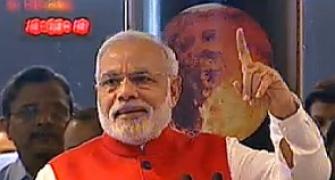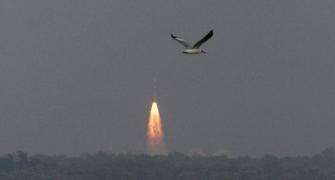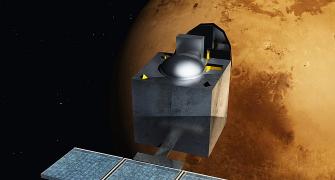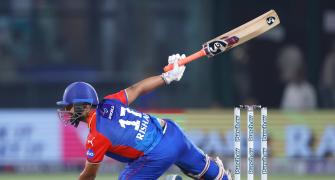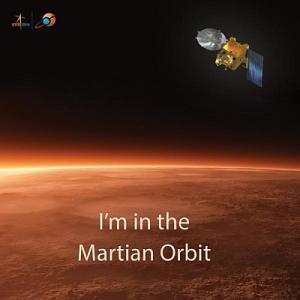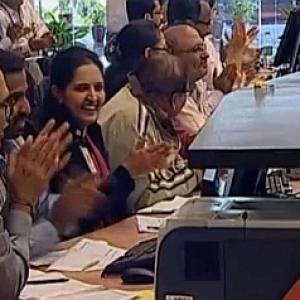'This demonstration of technology is exciting, as is the fact that it has been done with so little expense, says M N Vahia, Professor in the Department of Astronomy & Astrophysics, Tata Institute of Fundamental Research. The Indian Space Research Organisation is now an established leader in utilitarian space technology -- remote sensing and communication.
The Indian Space Research Organisation is now an established leader in utilitarian space technology -- remote sensing and communication.
It is important for ISRO to take up other challenges that will challenge its limits and expand its capabilities in a worthwhile manner.
Chandrayaan was the first such challenge in which ISRO performed brilliantly.
For example, it established the presence of water on Moon that had only been hinted at by other studies.
MOM is a well organised small (1,500 kg) satellite that can reveal interesting information about Mars and induce us to develop new technology and mission management skills. This is a technology demonstration mission.
The distance between Earth and Mars can vary between 54.6 million kilometre to 401 million kilometre. Even at its closest approach, Mars is like a fast moving Rs 5 coin about one kilometre away. So it is not surprising that many have failed to reach there.
The first technological command we need to demonstrate is that we can undertake complex calculation of sending an object, to a planet that is as small as that. The method that India adopted -- of using the Earth’s gravity to slingshot MOM is a peculiarly Indian approach.
It takes a long time and the timing precision required for it is also demanding but is economical on the fuel used by the satellite.
The next objective is to understand how to send instruments into space with the required precision, make them hibernate for three hundred days and then bring it back to life.
We also need to learn how to make such missions intelligent enough to look after themselves and do what we want them to do on their own, and do it with highest economy, in weight, volume power
The sunlight for Mars is also much weaker than on Earth so the power available with the satellite is also limited. Hence the signal from MOM will be extremely faint.
So getting faint signals from the MOM is also a challenge.
In this, the cooperation with NASA has been a great help and we have used NASA deep space network for this purpose.
Even though largely a technology demonstration mission, MOM also carries 5 important instruments.
These include imagers in optical and infrared, a photometer, an instrument to study the impact of neutral material around Mars and a methane sensor. While the imagers will allow us to image the surface of Mars and to determine its surface and atmospheric light reflectivity, the neutral material detector will help us understand how the solar radiation falling on Mars ablates the atmospheric material.
The most watched detector will be the methane sensor. Methane gas is highly reactive and it reacts and changes form quickly.
It can only be sustained by continuing chemical reactions or life forms -- on earth the bacteria from guts of cows are the most prolific producers of methane which is also a greenhouse gas.
There are some tentative detection of methane on Mars. Now MOM will, once and for all, check if those results are true and, if so, what is the location from where the methane is coming.
The overall purpose of all missions to Mars is to study what will be needed to make it habitable.
ISRO can use its superior capabilities in remote sensing to map Mars and see if it can be made liveable, or if life exists below the surface of Mars. So for scientists it is an exciting mission also.
As a scientist therefore I am excited about this demonstration of technology by ISRO, as an Indian I am proud that ISRO has dreamed an impossible dream and made it possible and as a tax payer I am happy that it has done so with so little money.
Yes, I am a proud and happy Indian today, excited that Indians now have clocked their first mission to Mars.

